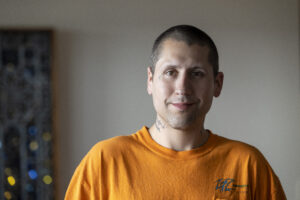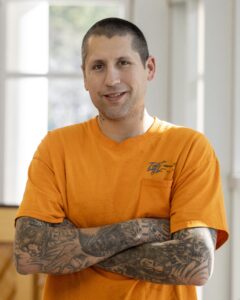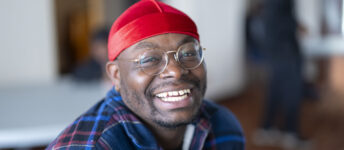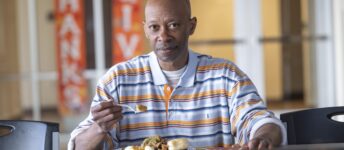David
The Tats Tell the Tale
It’s remarkable what you can learn from a person’s tattoos. Every drop of that ink is part of a journey, often adding up to a life story.
That’s certainly true of David, whose tats tell a tale of twists and turns that give you a pretty good picture of the things that matter in his life…and the things that no longer matter, but serve as reminders of where he’s been.
At the top of the list of things that matter are his daughters. He got their names and birthdays tattooed “so I won’t forget” their yearly celebrations. Because it’s easy to forget such things during the interminable days when you’re doing time.
Almost half a lifetime ago, David, then 20, was sentenced to 10 years in prison for armed robbery. He was deep into the throes of addiction when he held up a drug dealer. When the cell doors slammed behind him, he had a 9-month-old baby girl and another on the way.
David, now 34, says all those years in prison “gave me time to think.” He thought a lot about his girls, and that made him think about turning his life around.
And that ultimately made him think about coming to a place like The Union Mission, where David has found new life and a future of hope and promise.
But we’ll get back to that in a moment. We’ll let those tats tell more of the story.
Many of them, David got while incarcerated. For example, there’s a picture of a guard tower with “The Price of Evil” written above it. It’s pretty self-explanatory, but he wanted a constant reminder of the price he paid for his choices while younger.
During a stint in the Navy, he became addicted to heroin. The Navy ended up giving him an other-than-honorable discharge, defined as “the most severe nonpunitive discharge,” one that is “typically reserved for U.S. service members who have committed serious offenses or misconduct . . . that could be considered a misdemeanor in the civilian world.”
“Heroin took me down a really bad path,” he says. “And that’s when the robbing came in. I started robbing dealers to supply my habit.”
Finally, irony of ironies, a drug dealer that David had robbed called the police. Selling illegal drugs might be a crime, but using a gun to steal money is worse.
“I was 100 percent in the wrong,” David says. “Just strung out and desperate.”
Down to B-U-S-I-N-E-S-S
In another tattoo, the word B-U-S-I-N-E-S-S is inked across David’s knuckles, one letter per finger. It’s one of several ink jobs he got in prison, when he joined a gang. Several of his tats have gang meanings, and David doesn’t like to talk about them. He’s renounced that lifestyle through and through.
But he will talk about a few others—like the teardrop tat that represents his grief over a friend who died in a drowning incident. Another tat has a military motto, “Death Before Dishonor.” And another says, “Family Before All.”
“I should have lived by that family motto 10 or 15 years ago,” David says. “But I try to live by it now.”
 David grew up in a Christian home, believing in God.
David grew up in a Christian home, believing in God.
“My mom was pretty hardcore about it,” he says. “Sometimes I’d be in church three or four times a week with youth group and other things. And my mom was the cleaning lady there, so she dragged me along. We were there all the time.
“So I grew up knowing better, before I started making mistakes. And that hurt my family.”
David shakes his head while thinking about it. Never again.
Finally, David gets around to what he calls “my favorite tattoo,” an image of a demon positioned over the Bible. The demon’s arms are crossed and his head is bowed, “like he’s repenting to God.”
Asked if that represents himself, David replies, “Yeah, kind of. He’s trying to get back, trying to get right.”
Getting Right
Long before he was released from prison, David knew he never wanted to go back.
“Prison is a horrible place,” he says. “Your freedom is gone. You don’t have any choices, not even when or where to go to the bathroom. It’s humiliating. So I told myself that I’ll never put myself in a position where that can happen to me again.”
Thinking of his daughters carried him through, “but watching your kids growing up through pictures, that’s rough.” Still, those photos of his girls kept him motivated.
When he was finally released, David wanted to stay straight and live right, but he wasn’t quite sure how to go about it. He bounced around a few hotels till he ran out of money. Then he stayed in his car for a while, spending the nights in parking lots.
It wasn’t long before he’d had enough: “I was at rock bottom.”
David eventually made his way to The Union Mission, where he could quickly tell he’d landed in the right place.
“I had bad ideas about a [homeless] shelter, because I’d never been in one. I thought it was going to be three bunk beds high, a bunch of guys crammed in, drugs, not a good environment….But when I came here, it was totally different.”
He says the staff, particularly his case manager, Rev. Raymond Evans, has been kind and helpful. They’ve helped him stay sober, gave him time to save money—he’s a plumber on the verge of earning his professional certification—and equipped him with the life skills that will keep him on a good path. And his faith has been rekindled.
“My relationship with God has gotten stronger,” he says. “The Mission has given me peace.”
 David got engaged while at the Mission, and he and his fiancée recently bought a home. They’ve moved in, and he’s working on gaining custody of his daughters—now 14 and 13—who have been living with their maternal grandparents. They support his goal to reunite his family.
David got engaged while at the Mission, and he and his fiancée recently bought a home. They’ve moved in, and he’s working on gaining custody of his daughters—now 14 and 13—who have been living with their maternal grandparents. They support his goal to reunite his family.
He’s excited about the rest of his life, and is grateful for his time at the Mission.
“If it weren’t for The Union Mission, I would probably be sleeping in my car and doing something bad,” David says. “I might have gone back down that dark hole.
“I’d like to give a shout-out to the Mission, and the counselors, for doing good things. It’s an amazing thing!”
Maybe even amazing enough to warrant its own tattoo!
— Mark Moring for The Union Mission



